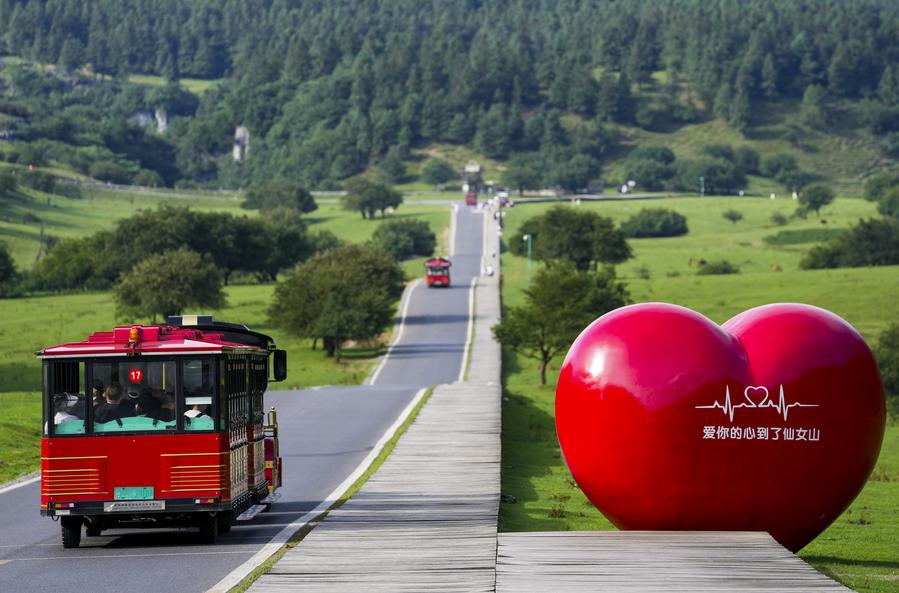


Tourists take a sightseeing car at the Fairy Mountain National Forest Park in Wulong District, southwest China's Chongqing Municipality, July 22, 2024. (Xinhua/Liu Chan)
CHONGQING, Oct. 17 (Xinhua) -- Ran Guangfang, 54, from Jingzhu Village in southwest China's Chongqing Municipality, has experienced a remarkable transformation. The former farmer has laid down her hoe and gained local fame as a skilled barista, a change driven by the recent boon in rural tourism across the country.
"A few years back, I was growing flue-cured tobacco," Ran recalled. Indeed, every household in Jingzhu once relied on this crop, despite many struggling to get by on the meager earnings they reaped.
Nestled in the heart of the Fairy Mountain in Wulong County, Jingzhu, with its abundant forests, meadows and valleys, was once a remote and overlooked hamlet due to the poor traffic infrastructure.
The turning point came in 2012 when the local government paved roads that linked the village to the outside world, gradually revealing its tourism potential.
In 2015, Fairy Mountain became a national tourism resort area. Riding high on the tourism wave, Jingzhu seized the golden opportunity for development.
Dilapidated houses were renovated into tea shops and libraries, giving the village a new lease of life as a sought-after destination for those yearning for traditional nostalgia.
In December 2022, Jingzhu was named one of the Best Tourism Villages of 2022 by the United Nations World Tourism Organization.
Ran now works in a two-story glass building, repurposed from a tobacco barn to a coffee bar and a rural library.
"Initially, my job was cleaning and washing coffee cups. The barista, a young man in his twenties, noticed my curiosity and taught me how to make coffee," Ran said, remembering the first time she tasted her own brew. "It was incredibly bitter!"
She may not have liked the taste, but the experience whetted her appetite for a new opportunity. She diligently made notes and practiced during her downtime at the shop. With additional vocational training, she finally became a skilled barista, crafting a variety of coffees.
During this year's National Day holiday, she helped sell hundreds of cups at 30 to 40 yuan (about 4.2 to 5.6 U.S. dollars) each, generating over 10,000 yuan in revenue per day for the coffee shop.
"Great changes have occurred in recent years. All my family now work in our home village and tend to the fields in our spare time. Our annual income has tripled to about 100,000 yuan," Ran said.
Statistics show that the local per capita annual net income has reached 22,000 yuan, with locals making up over 60 percent of the village's tourism workforce.
China is actively promoting the modernization and revitalization of rural industries. According to the Ministry of Agriculture and Rural Affairs, significant progress has been made in both agricultural product processing and rural tourism.
Official statistics released in August show that nearly 2,000 beautiful leisure villages like Jingzhu have been established across the country.
点击右上角![]() 微信好友
微信好友
 朋友圈
朋友圈

请使用浏览器分享功能进行分享
